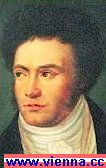|
| |  Special
tickets Special
tickets
A Beethoven concert always is a great event. Tickets for seats in the orchestra
let the music feel... After these personal concert impressions here a some
facts:
Classical music
Heavy individual expression is typical for Beethoven's music. Listen to
Beethoven with eyes closed. Critics write
of "Power of the Rhythm", "melodic expansion", "dynamic
contrasts". Whether piano concert or orchestral concert - Beethoven is a
wonderful experience. There are innumerable festivals, matinees or concert
evenings, where Beethoven's works are performed.
Beethoven paved the way for the two musical currents of the 19th century:
- the conservative line with Brahms, Mendelssohn, Schumann
- the newgerman school with Liszt, Richard Strauss, Wagner
The ten Symphonys
The first symphony (op.21 C major), dedicated to Baron van Swieten, Beethoven
wrote in 1799 under the impression of the French revolution. Parallel to the
"Heiligenstaedter Testament" 1803 Beethoven completed his second
symphony (op.26 D major).
In August 1804 he finished the third symphony "Eroica" (op.55 E
flat major) and was originally called ,,symphony eroica, composta per
festeggiare il souvenire di un grand Uomo" (composes to celebrate the
memory of a great man). Critics and audience mentioned the work as too complex,
too long and at all against morality. Originally Beethoven dedicated this work
to Napoleon, but he withdrew the dedication as Napoleon was crowned to emperor
on May 20, 1804 and the Duke from Enghien was murdered on March 21, 1804. He now
dedicated the work to his sponsor Prince Lobkowitz.
The fourth symphony (op.60 B major) Beethoven composed in 1806, rather
unknown because very simply and short held, nevertheless it was a public
success. The fifth symphony (op.67 C-Moll) was written 1808, unusual instruments
such as piccolo and trombones were included. Famous is his sixth symphony,
called Pastorale" (op.68 F major), 1808 and the theme is about humans and
nature. 5th and 6th symphony were first performed on December 22, 1808 in
Theater an der Wien.
The seventh symphony (op.92 A major) developed 1811-1812 and was first
performed with "Schlachtgemaelde Wellingtons Sieg bei Vittoria
(op.91)" (around Wellington's victory in the battle near Vittoria).
Napoleon's Russia-war ended in a disaster (1812 in Moscow) and the public was
enthusiastic about the musical conversion of the Napoleon's defeat.
1814 was the fist performance of Beethoven's 8th symphony (op.93 F major),
which already was finished in 1812. Beethoven praised it as his best work, the
audience was not as enthusiastic.
1824 he wrote the 9th symphony (op.125 D-Moll), which needed a never before
so big orchestra including a choir. The choir final forms the toned "Ode an
die Freude" (Ode to joy) by Friedrich Schiller, a poet of the German
classical period. The premiere was on May7, 1824 in the Kaernthnerthor theatre.
For the 10th symphony only an announcement Beethoven's is known, a gentle
introduction in E flat major and a Allegro in C-Moll was planned; we do not know
more about it.
 Beethoven's
sonatas Beethoven's
sonatas
Beethoven composed 32 pianosonatas. They resulted probably partially from
improvisation. Worth mentioning are
- the Sonate Pathetique (op.13), published
1799 and dedicated to the Prince Karl Lichnowsky, the biggest sponsor
Beethoven's,
- the Mondscheinsonate (op.27/II) (Moonshine-sonata), published
1801 and dedicated to his piano pupil Julietta Giuccariardi
Operas
Beethoven wrote two operas, only "Fidelio" is worth mentioning.
This opera was first performed on November 20, 1805 in Theater an der Wien and
was an ordered work by this theatre. "Leonore" fell into oblivion.
Other works
Beethoven wrote 16 string quartets, some overtures and masses. The piano tune
"Fuer Elise" (for Elise) is famous, possibly dedicated to Therese Malfatti.
 Home - Vienna - Photos
- Music - Traveltips
- Tours - Boattrip
- Coffeehouse - Heuriger/Wine
- Links - Search - About
Home - Vienna - Photos
- Music - Traveltips
- Tours - Boattrip
- Coffeehouse - Heuriger/Wine
- Links - Search - About
|
![]() Home - Vienna - Photos
- Music - Traveltips
- Tours - Boattrip
- Coffeehouse - Heuriger/Wine
- Links - Search - About
Home - Vienna - Photos
- Music - Traveltips
- Tours - Boattrip
- Coffeehouse - Heuriger/Wine
- Links - Search - About